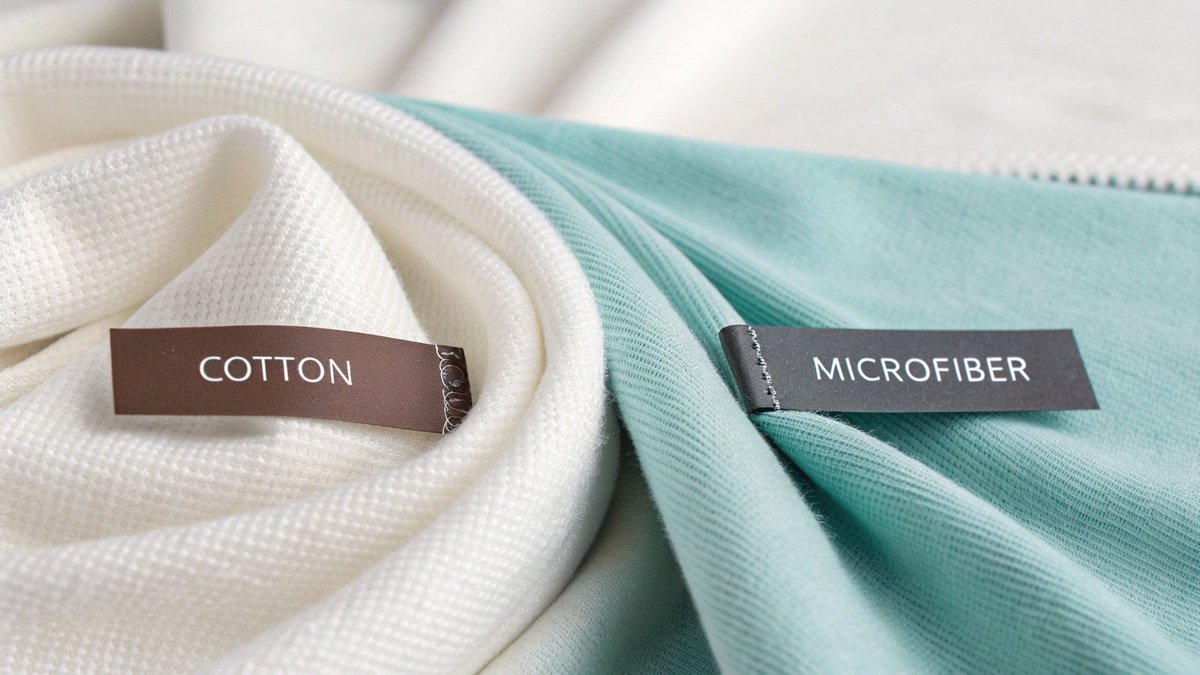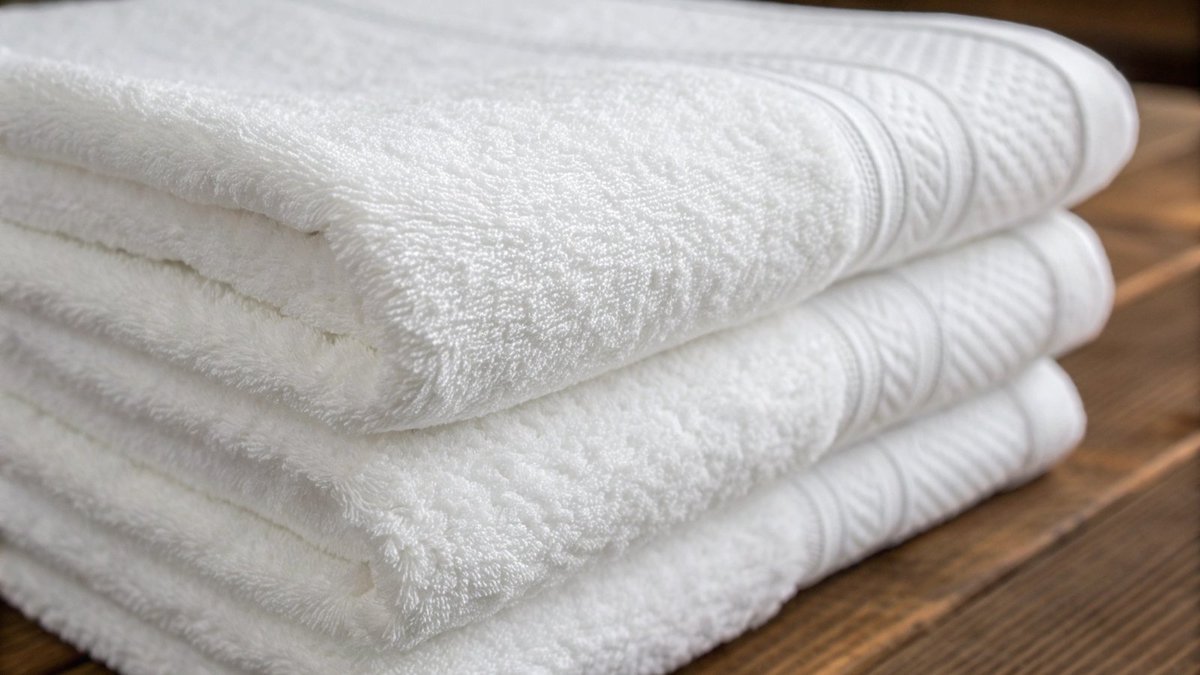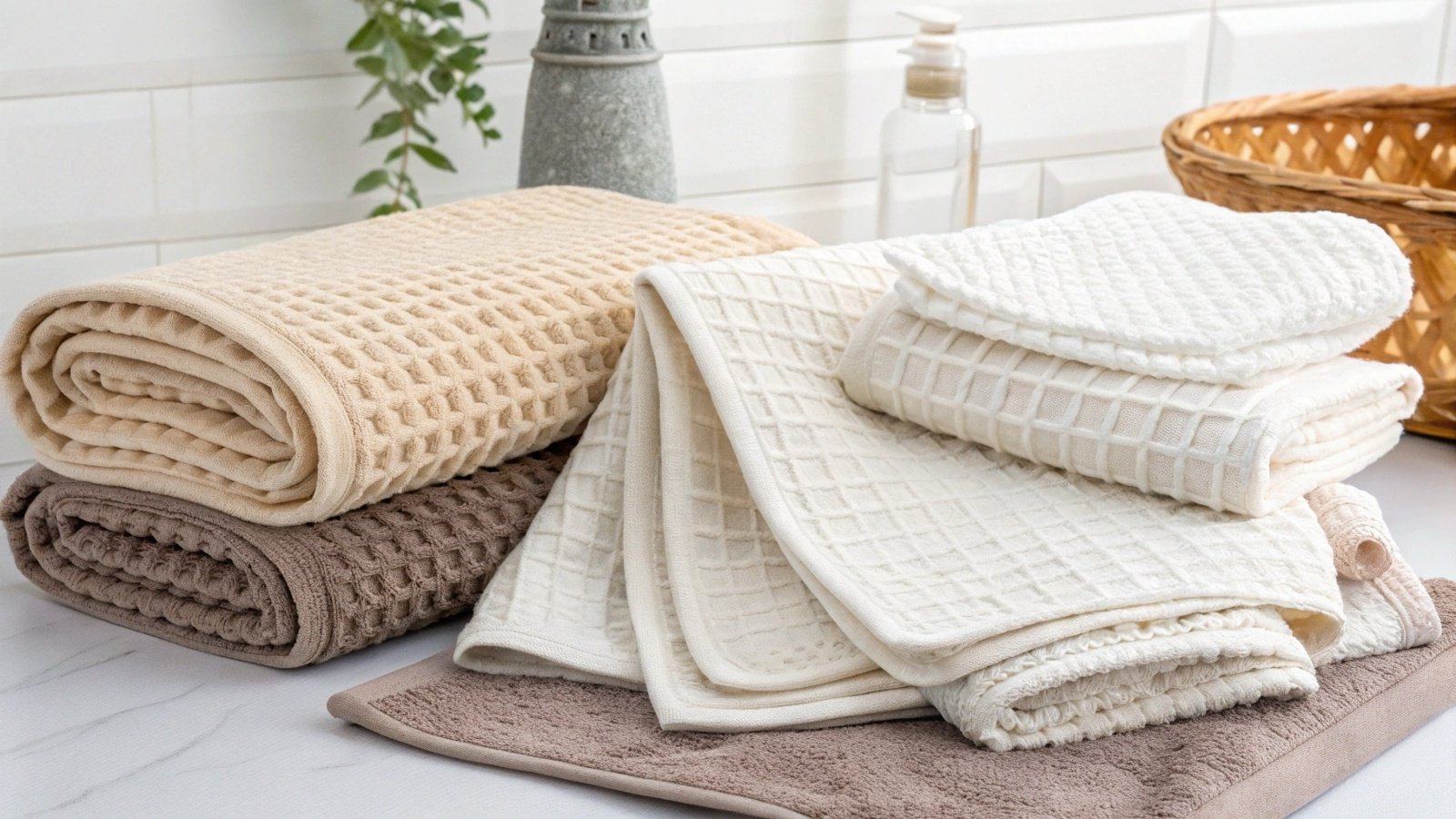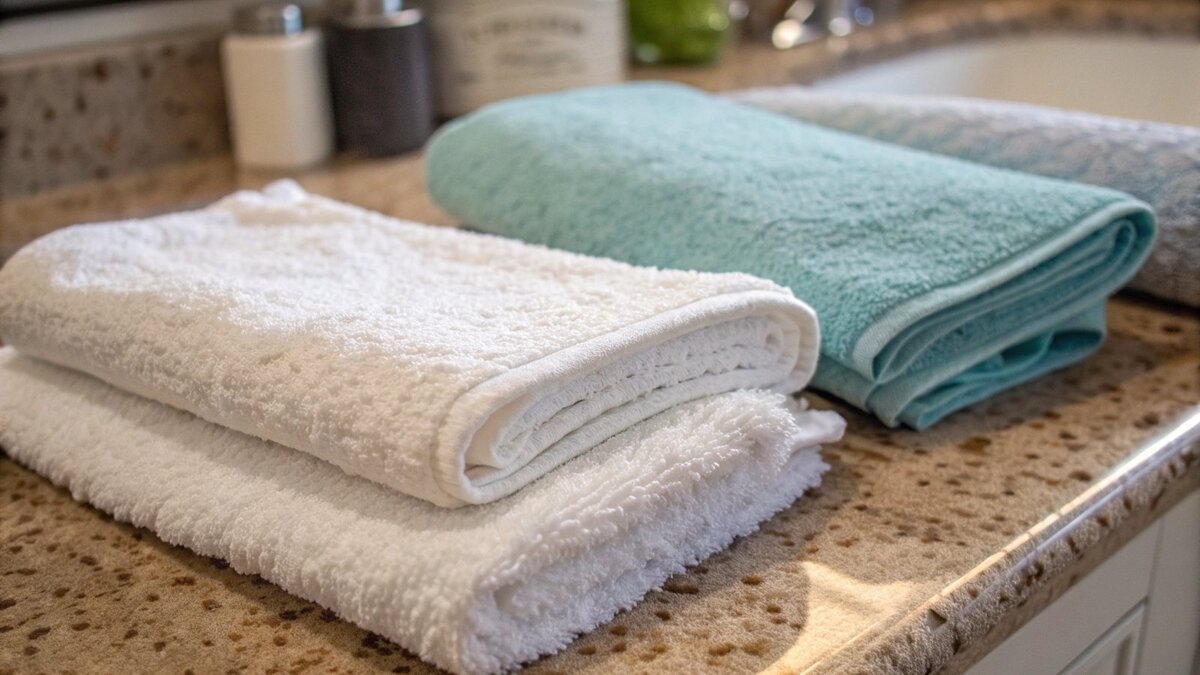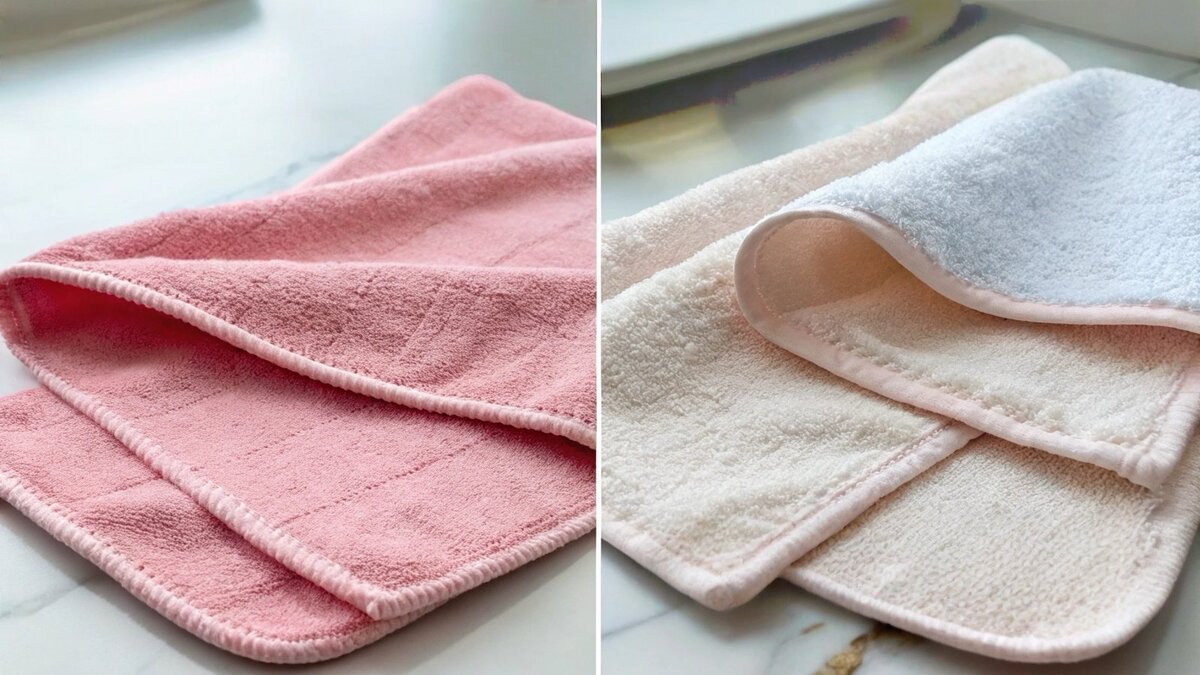Struggling to choose the right face towel for your brand? You want premium quality, but the options are overwhelming. I will guide you to the perfect choice for your customers.
As a manufacturer, I recommend focusing on three things: material, weave, and care instructions. High-quality cotton, especially long-staple types, gives the best mix of softness, absorbency, and durability. This creates a luxury feel that customers appreciate. Microfiber is also a great choice for specific needs.
That is the short answer. But the best choice really depends on your specific customer and how they will use the towel. For you to make a confident decision for your brand, it is important to understand the details. Let’s break down the key factors you need to think about.
What is the best material for face towels?
Confused by material labels like combed, ring-spun, or Egyptian cotton? You need a material that feels premium and performs well. I will explain the best options for quality face towels.
The best material is high-quality, long-staple cotton like Egyptian or Pima cotton. Their long fibers create a towel that is very soft, highly absorbent, and strong. This ensures a premium experience for your customers every time they use it.
When we talk about towels at the factory, it all starts with the raw fiber. The length of the cotton fiber is the most important factor for quality. Longer fibers can be spun into smoother, stronger yarns. This is why some towels feel incredibly soft and last for years, while others feel scratchy and fall apart.
Why Long-Staple Cotton is King
Long-staple cotton has fibers that are over 1 1/8 inches long. This extra length means fewer fiber ends are exposed on the surface of the yarn. The result is a towel that is less prone to pilling and shedding, and feels much softer against the skin. From my experience helping brands develop their towel lines, those who invest in long-staple cotton, like Turkish or Pima, see much better customer feedback. The towels just hold up better and maintain that luxury feel wash after wash.
Key Cotton Types to Know
| Cotton Type | Key Feature | Best For |
|---|---|---|
| Egyptian Cotton | Extra-long staples, ultimate softness and absorbency. | Premium, luxury hotel and spa lines. |
| Pima Cotton | American-grown long-staple cotton, very soft and durable. | High-end retail and direct-to-consumer brands. |
| Turkish Cotton | Long staples, strong and gets softer over time. | Quick-drying luxury towels, great for humid climates. |
| Combed Cotton | Fibers are combed to remove short threads, making it softer. | Mid-range to high-end towels, a solid upgrade from standard cotton. |
What is the best type of towel for your face?
Is a fluffy towel always better for the face? The wrong texture can actually irritate sensitive skin. Let me show you which towel types work best for different skin needs.
The best type of towel for your face depends on skin type. For most people, a soft, low-pile terry cotton towel is perfect. For sensitive or acne-prone skin, a smooth waffle weave or a gentle microfiber cloth can be better to avoid causing irritation.
It’s not just about the material, but also how that material is constructed. The weave and weight of a towel change how it feels and performs. A few years ago, a boutique hotel client wanted the plushest face towels possible. We made them some 700 GSM towels. They felt amazing, but they took forever to dry in the hotel’s humid environment, which led to mildew complaints. We switched them to a 550 GSM towel with a slightly lower pile, and it solved the problem completely. They got the luxury feel without the drying issue.
Matching Towel Type to Skin Type
It is important to think about the end user. A towel is a tool for skincare.
- For Normal Skin: A standard terry cloth towel is great. The loops are effective at absorbing water without being too harsh. A GSM between 400-600 is the sweet spot for a balance of softness and quick drying.
- For Sensitive Skin: Look for a lower pile, or even a velour finish where the loops are sheared off on one side. This creates a very smooth, plush surface that reduces friction on the skin.
- For Oily or Acne-Prone Skin: A waffle weave is an excellent choice. The open pockets in the weave help lift away moisture and oil quickly and provide very light exfoliation. Microfiber is another top contender here.
The Importance of Weight (GSM)
GSM stands for Grams per Square Meter. It is a measure of the towel’s density.
- 300-400 GSM: Lighter, thinner, and quick-drying. Good for gym or travel towels.
- 400-600 GSM: The perfect range for everyday face towels. They feel substantial and soft but still dry reasonably fast.
- 600-900 GSM: Heavy, ultra-plush, and very absorbent. These are luxury towels, but they take much longer to dry.
Why do face towels get hard?
Are your brand’s towels losing their softness after just a few washes? This common problem can hurt your reputation. I will explain why it happens and how to stop it.
Face towels get hard mostly because of detergent residue and mineral buildup from hard water. Over-drying with high heat also damages the cotton fibers, making them stiff and scratchy. Using the right washing and drying methods is the key to keeping them soft.
I get this question all the time from clients. They approve a beautiful, soft pre-production sample, but then get calls from customers that the towels feel like sandpaper after a month. The issue is almost never the towel itself, but how it is cared for. We now include a small care guide with all our first-time orders to help our clients educate their customers. It makes a huge difference in customer satisfaction. The main culprits are things people do thinking they are making the towels cleaner or softer, but they are actually doing the opposite.
The Main Causes of Stiff Towels
Understanding the root cause is the first step. The problem is usually a buildup of something on the fibers.
- Detergent Buildup: Using too much soap is the number one issue. The excess detergent doesn’t fully rinse out and leaves a stiff residue on the cotton fibers.
- Hard Water: Water with high mineral content, like calcium and magnesium, leaves deposits on the fabric. Over time, this buildup makes the towel rigid.
- Fabric Softener: This is a surprise for many people. Liquid fabric softeners coat the fibers with a waxy, water-repellent film. It makes them feel soft at first, but it destroys their absorbency and leads to stiffness over time.
- Over-Drying: Cooking your towels on high heat is like baking the fibers until they are brittle. This breaks down the cotton and makes it feel rough.
To fix this, I advise washing towels in warm water with half the recommended amount of detergent. Then, add a cup of white vinegar to the rinse cycle once a month. The vinegar strips away all the residue and restores softness without damaging the fibers.
Is microfiber better than cotton for face towels?
Wondering about the cotton vs. microfiber debate? Choosing the wrong one can disappoint customers who expect a certain feel or performance. I will break down which material is better for different face care needs.
Microfiber is not always better, but it is superior for specific jobs. It is amazing at removing makeup, oil, and dirt because of its fine, static-charged fibers. But, cotton offers a more natural softness and a luxury feel for general drying.
The choice between microfiber and cotton really comes down to purpose. I worked with a direct-to-consumer skincare brand that wanted to launch a makeup-removing cloth. They initially wanted a soft white cotton towel. I explained that while cotton is great, it tends to smear makeup and oils around. We did a test run of 500 microfiber cloths for them instead. They were a huge hit because their customers saw how the microfiber "grabbed" the makeup right off their skin. It was the right tool for the job. For a different client, a luxury spa, cotton was the only choice because their customers wanted that plush, natural, and highly absorbent feel after a treatment.
When Microfiber Wins
Microfiber is a synthetic material made of ultra-thin polyester and polyamide fibers. These fibers are split, which creates a huge amount of surface area and a natural static charge.
- Cleaning Power: It excels at lifting and trapping dirt, oil, and makeup instead of just pushing it around. This is why it is fantastic for acne-prone skin.
- Quick-Drying: It holds much less water than cotton and dries very fast, making it resistant to mold and mildew.
- Durability: High-quality microfiber can withstand hundreds of washes without losing its effectiveness.
When Cotton is the Champion
Cotton is a natural fiber that has been the standard for towels for centuries for good reason.
- Absorbency and Softness: Nothing beats the feeling of a plush, high-quality cotton towel for patting your face dry. It absorbs water quickly and feels gentle and luxurious.
- Natural Feel: It is naturally hypoallergenic and breathable, which is a major selling point for many consumers who prefer natural materials on their skin.
Here is a simple comparison:
| Feature | Microfiber | Cotton |
|---|---|---|
| Cleaning | Excellent (lifts dirt/oil) | Good (smears more) |
| Absorbency | Good (holds less water) | Excellent (holds more water) |
| Softness | Functional softness | Luxurious softness |
| Best For | Makeup removal, oily skin | General drying, sensitive skin |
Conclusion
Choosing the right face towel means matching the material and type to your customer’s needs. Focus on quality cotton for luxury and microfiber for performance to ensure total customer satisfaction.

